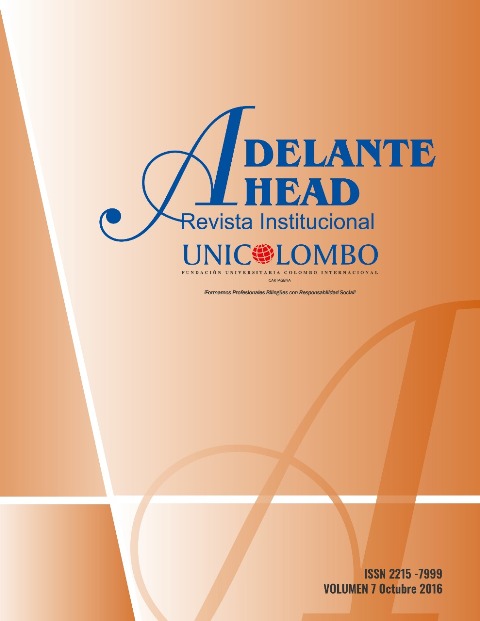The Effect of a Dual Intervention on University Students’ Academic Writing Skills: A Case Study
Resumen
Abstract: Fifth semester students enrolled in the Bachelor in Education with an emphasis in English at a private university in Cartagena, Colombia, take content-based courses, among which is Second Language Acquisition II (SLA II). As part of the course, students are required to read academic papers for class debates as well as writing academic reflection papers. However, the experience of one of the teacherresearchers who participated in this study reveals that at the beginning of these courses, most of the students seem to lack the necessary academic reading and writing skills to complete the assignments properly. In response to this situation, we proposed a dual pedagogical intervention that included a 15-hour pre-semester course in academic writing and a subsequent academic writing course in Moodle (a free elearning platform). This paper describes the effect of the former on the academic writing skills of 16 students in a SLA II class. Two surveys related to the effectiveness of the intervention were administered to them: one right after they attended the classroom-based course, and the other one after they submitted their final draft of their reflection papers. Then, their final versions of the papers were evaluated and compared to those written by another group. Findings suggest that the intervention helped to improve some aspects of academic writing. Further research is needed to explore alternative ways of tackling this issue
Keywords: academic writing, writing skills, reflection papers, content-based instruction
Resumen: Los estudiantes de quinto semestre, matriculados en el programa de Licenciatura en Educación con énfasis en inglés en una universidad privada de Cartagena, Colombia, toman cursos basados en contenido, entre los cuales se encuentra el de Adquisición de Segundas Lenguas II (SLA II). Como parte del curso, los estudiantes deben leer documentos académicos para los debates en clase y redactar artículos de reflexión. Sin embargo, la experiencia de uno de los profesores-investigadores que participó en este estudio revela que, al iniciar estos cursos, la mayoría de los estudiantes parecen carecer de las habilidades de lectura y escritura académicas necesarias para completar las tareas correctamente. En respuesta a esta situación, hemos propuesto una intervención pedagógica dual que incluye un curso presemestral de escritura académica con una duración de 15 horas y un curso posterior de escritura académica en Moodle (una plataform a gratuita de aprendizaje electrónico). Este artículo describe el efecto del primero, en las habilidades de escritura académica, de 16 estudiantes en una clase SLA II. Dos encuestas relacionadas con la efectividad de la intervención fueron aplicadas a los estudiantes: la primera, una vez terminado el curso presencial y la segunda después de la entrega de los artículos de reflexión. Posteriormente, las versiones finales de los artículos fueron evaluadas y comparadas con los escritos por otro grupo no intervenidos. Los resultados sugieren que la intervención ayudó a mejorar algunos aspectos de la escritura académica de los estudiantes. Se requiere de más investigación para explorar otras alternativas que permitan abordar este
asunto.
Palabras clave: estudiantes universitarios, escritura académica, habilidades de escritura, instrucción basada
en contenidos
Citas
References
Adas, D. & Bakir, A. (2013). Writing Difficulties and New Solutions: Blended Learning as an Approach to Improve Writing Abilities. International Journal of Humanities and Social Science , 3 (3), 254-26
Aldana, A. (2005). The process of writing: A text by using cooperative learning. Profile, Issues In Teachers Professional Development, N°6, p.47-57.
Ariza, A. (2005). The Process-writing approach: An alternative to guide the students’ compositions. Profile, Issues In Teachers Professional Development, 6, 37-46.
Benson, P. (2011). Teaching and researching autonomy. Harlow: Longman.
Biber, D., Conrad, S., Reppen, R., Byrd, P. & Helt, M. (2002). Speaking and writing in the university: A multidimensional comparison. TESOL Quarterly, N° 36, p. 9–48.
Boyatzis, R. E. (1998). Transforming qualitative information: Thematic analysis and code development. London: Sage Publications.
Council of Europe. (2001). Common European framework of reference for languages: Learning, teaching, assessment. Cambridge, U.K: Press Syndicate of the University of Cambridge.
Griffee, D.T. (2012). An introduction to second language research methods: Design and data. California: TESL-EJ Publications.
Lehman, R. & Conceiçao, S. (2010). Creating a sense of presence in online teaching. Jossey-Bass. San Francisco.
Nunan, D. (1999). Second language teaching and learning. Boston: Heinle ELT.
Patton, M. Q. (1990). Qualitative evaluation and research methods. Newbury Park, CA: Sage.
Smith, R. (2008). Conquering the content: A step-by-step guide to online course design. San Francisco: Jossey-Bass.
Viáfara, J. (2007). Student teachers’ learning: The role of reflection in their development of pedagogical knowledge. Cuadernos de Lingüística, N° 9, p.225-242.




